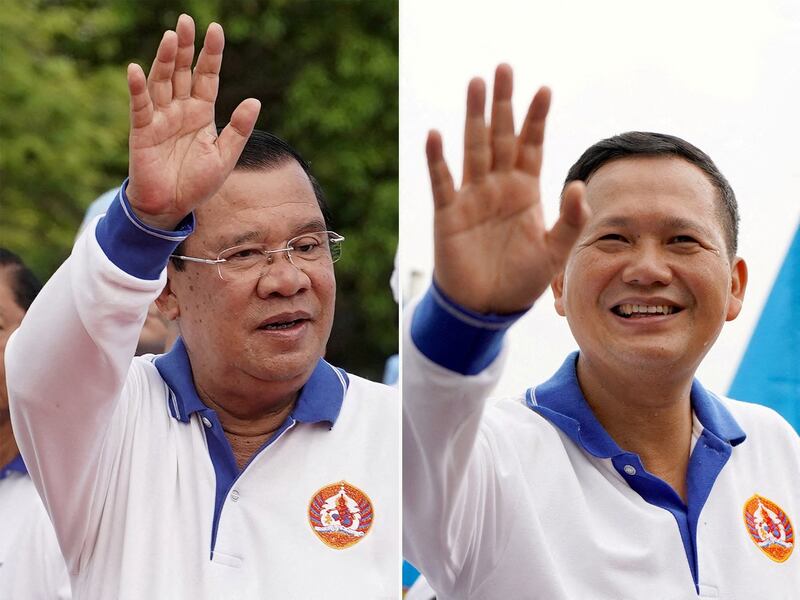Cambodia’s King Norodom Sihamoni on Monday issued a royal decree to appoint Hun Sen’s eldest son Hun Manet as the country’s prime minister, ensuring that the transfer of power from father to son will occur later this month.
According to the decree, Hun Manet will assume the office on Aug. 22, when the newly elected National Assembly adopts the new cabinet. It will be the completion of years of preparation for a transfer of power from father to son, as the 71-year-old Hun Sen, who has ruled the country since 1985, prepares to step aside.
Hun Sen did however say that he would continue to have a role in government for the next 10 years.
Hun Manet’s royal appointment comes after the country’s electoral body on Saturday announced last month’s election results, which gave Hun Sen’s Cambodian People’s Party, or CPP, 120 of the assembly’s 125 seats.
The election has been criticized by the international community for being neither free nor fair, as the main opposition party was disqualified from participating.
Analysts and opposition party officials have criticized Hun Manet’s appointment as prime minister, saying that dynastic rule has no place in a democracy.
Finland-based political analyst Kim Sok told RFA’s Khmer Service that Hun Manet lacks the acumen to solve Cambodia's national problems.
“Hun Manet has only one policy: to follow his father. And his father, although the CPP has written hundreds of good policies, has implemented only one point: to persecute the people,” said Kim Sok.
“[Hun Sen] has destroyed the nation, selling the nation to maintain power. Therefore the chaos that is the burden of the social crisis left by Hun Sen as a father will continue under Hun Manet and will be even more serious.”

Cambodian legal scholar Vorn Chanlouth told RFA that under the current legal process, there are no obstacles standing in Hun Manet’s way because the CPP has effectively prepared for the transfer of power. But there is still reason to doubt the legitimacy of it.
“The problem we have here is the transparency of PM candidate,” he said. “In this 7th legislative mandate election process, many political parties lack transparency, as they did not present their prime ministerial candidates to the public. For example, in the CPP, Hun Sen said he was the candidate, but when his party won, he passed the post to his son. This is not transparent.”
Chanlouth said that prime ministerial candidate should have come forward to explain to the public his party’s policies, but Hun Manetsaid nothing other than that he would follow in his father’s footsteps.
“We don’t know specifically or exactly what they are going to do to solve the national problems we face today,” he said.
‘Not over yet’
Hun Sen, meanwhile, has assured the public that “It is not over yet” in an announcement on his Telegram social media channel.
He said that in addition to being the father of the prime minister, he will continue in other positions until 2033.
Hun Sen is currently the president of the CPP, and he repeated his intention to become the president of the senate, a position currently held by CPP vice president Say Chhum.
Oum Sam An, a former lawmaker for the former main opposition Cambodia National Rescue Party, said that Hun Sen’s intention to assume future positions in government shows that he is “afraid of his own shadow,” meaning that he is afraid to face the law after he resigns as the leader of the country.
“The leadership has not changed,” he said. “Most of them are the children of members of the senior government, so the new bloods are the old blood taking on the jobs [of their parents].”
Kim Sok said that Hun Sen’s rule would be remembered for its destruction of natural resources, arrest of dissenting citizens, and other rights violations.
"Because the Cambodian people, the international community, and the International Court of Justice, cannot forget the story that the general public cannot forget about Mr. Hun Sen as the leader of a coup that robbed power and led a society through state terrorism,” said Kim Sok. “He used the name of the state to abuse the people and destroy them."
CPP spokesman Sok Ey San, however, denied that Hun Sen was responsible for killings or injustices on the Cambodian people in the past. He said those who dare to criticize without evidence will be held accountable before the law.
Translated by Sok Ry Sum. Edited by Eugene Whong.
